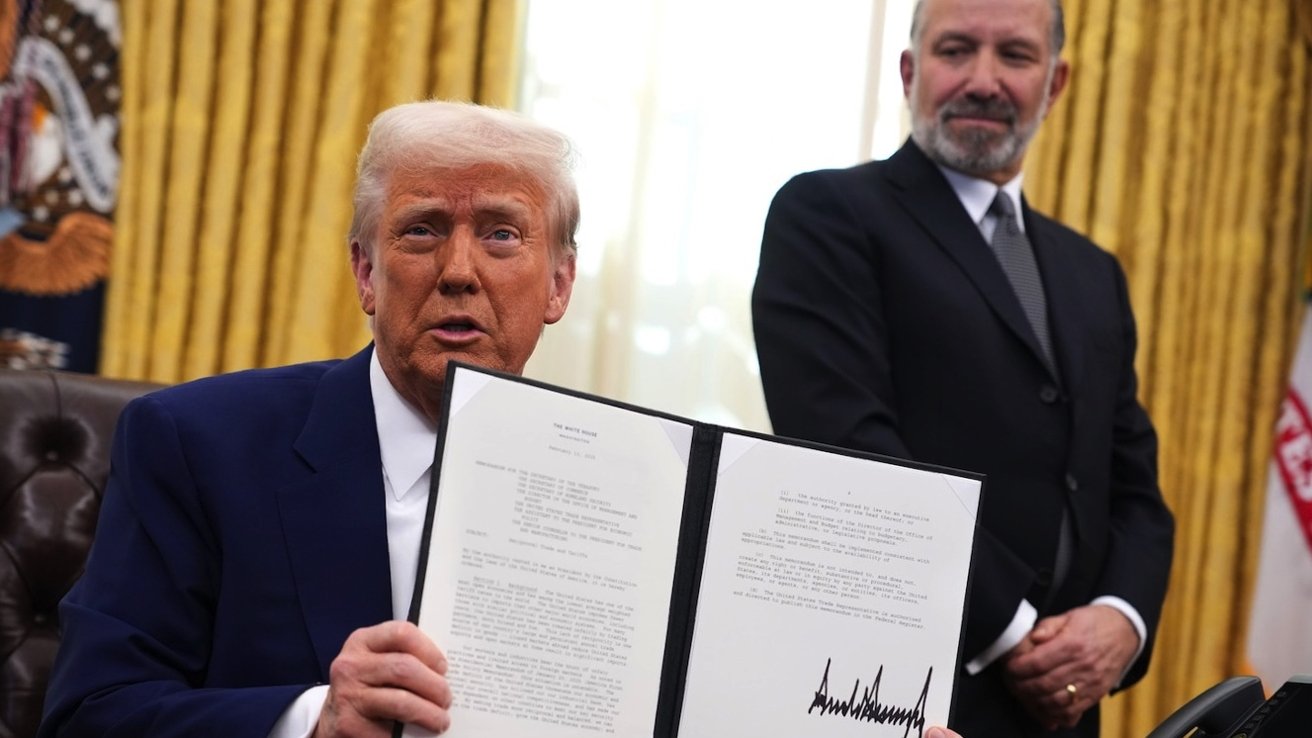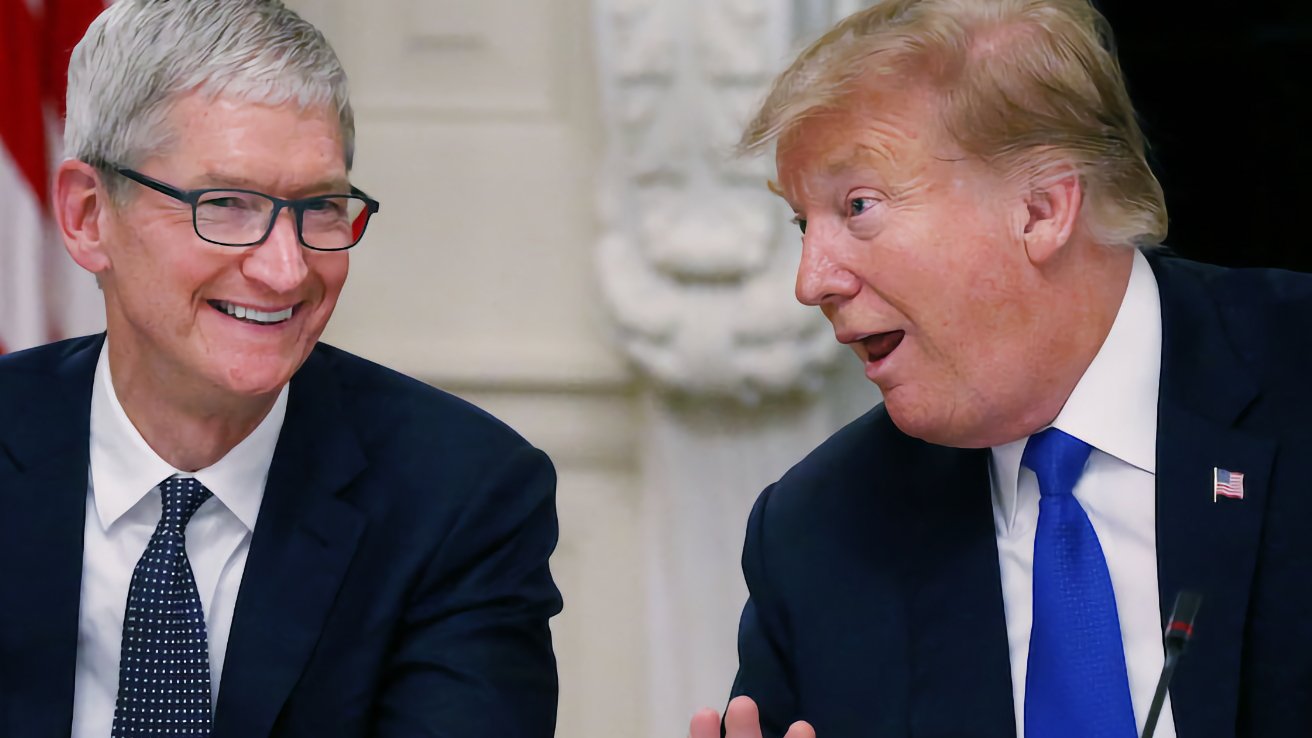Apple stock hammered for third consecutive market day, falls on news of more tariffs
While markets fluctuated insanely on rumors, the third consecutive trading day after the blockbuster tariffs announcement has again ended very badly for Apple, with it seeing billions more bled off of valuation.

Donald Trump showing off his signed tariff plan
Apple's shares were trading at $223.89 on April 2, 2025, before Trump imposed raised the cost of it doing business with every single one of its overseas suppliers. As with all stocks, Apple's shares took an immediate hit, dropping 7.5% overnight.
And, on Monday, the sell-off continued. At the close of business, Apple stock ended a tumultous trading day at $181.46, a $6.92 hit from Friday's close.
And during the day, historically bullish Morgan Stanley also revised its worst-case estimate that Apple shares would drop no lower than $200, because they did. When the shares were just under $200, Morgan Stanley estimated the cost to Apple was around $33 billion.
It wasn't over, though. By noon ET on April 7, Apple shares were down still further to $178.62.
They had continued to fall steadily since the announcement of the tariffs, but then Trump threatened to raise the China tariffs to from 54% to 104%. In one Truth Social post, Trump doubled Apple's costs of importing its components or devices from China.
Trump's White House also extinguished the closest AAPL has come to any sign of recovery. A claim that Trump was considering pausing the tariffs dubiously extracted from a Fox News interview saw the stock market jump back up -- only to be smashed right back down again when officials called it "fake news."

Donald Trump (right) with Tim Cook in 2020 -- image credit: Apple
The S&P 500 index rose 7% on the basis of the rumor, only to fall back again. Overall, on Monday, the S&P 500 dropped 69.56 points -- or 1.46% -- by noon eastern time.
At that point it was listed as 4998.32. Immediately prior to the original tariff announcement, it was at 5670.97. The S&P closed at 5062.25, down .11% on the day.
Trump's tariffs have had a similarly calamitous impact on stock markets around the world, which has in turn rebounded on the US. Following overseas falls, US stocks themselves dropped around 20%, and consequently the S&P 500 briefly entered a bear market status on Monday.
A bear market is when stocks fall 20%, and while it does not automatically mean a country is heading for recession, it can be a precursor to that. The S&P 500, at least briefly, rose back out of the bear market status, but the Nasdaq Composite Index is in one.
Apple has been hit the hardest by the tariff tumult
Apple is repeatedly said to be at least one of the worst-affected companies, because of its near total dependence on overseas firms. The company did manage to step up imports ahead of tariffs to avoid these extra costs, but even adding five flights full of iPhones will only help for so long.
And, it won't help September's iPhone 17 at all.
It was already believed inevitable that Apple will have to raise prices for consumers. But with all firms having to raise prices, consumers' ability to buy goods will be dramatically cut, so even a price increase will not mitigate Apple's losses.
Read on AppleInsider

Comments
"Under art. 1, § 8 of the Constitution, Congress has sole authority to control tariffs, which it has done by passing detailed tariff statutes. The President cannot bypass those statutes by invoking “emergency” authority in another statute that does not mention tariffs. His attempt to use the IEEPA this way not only violates the law as written, but it also invites application of the Supreme Court’s Major Questions Doctrine, which tells courts not to discern policies of “vast economic and political significance” in a law without explicit congressional authorization. If the IEEPA were held to permit this executive order, then the statute would run afoul of the nondelegation doctrine because it lacks an “intelligible principle” to limit or guide the president’s discretion in imposing tariffs."
https://nclalegal.org/press_release/ncla-sues-to-stop-trump-admin-from-imposing-emergency-tariffs-that-congress-never-authorized/
PS: Did you see that he wants to have a North Korea-esuqe military parade in DC on his 79th birthday. So much for reducing gov't waste... which we all knew was a lie to find to new ways to grift the American taxpayer.
https://appleinsider.com/articles/25/02/25/apples-500-billion-us-investment-announcement-is-business-as-usual
Collaboration beats competition every time.
- The number of Americans being able to afford an AI enabled phone will go down due to tariffs ($2000 iPhones). That old phone could last a few years more and so Apple shouldn't go online with capacity too early. A global recession due to tariffs = same story.
- Servers and solar panels are now much more expensive as they are hit by tariffs. This makes U.S. data centers more expensive.
Placing data centers just across the border could make sense. My bet would be on Canada. Reduced need for cooling, cheaper energy, and a stable political environment. Apple could let Foxconn own the centers to hide the investment.Unfortunately, there is an increasingly long line of Trumpalikes waiting to take his place, and an increasing number of people around the world willing to vote for them.
"... his qualms with “non-monetary tariffs” regarding the EU, but he was less vague than Bessent, suggesting that EU standards, rules and regulations were “non-monetary barriers” for US companies trying to trade with the bloc.
He wants the EU to lower protections of its citizens so that the US can have unfettered access.
It's not as if the US doesn't also have tests and regulations before allowing access to its market.
I hope the EU pushes back against all this.
The EU should respond like Canada has responded and they should not back peddle, when the liar, lies some more. In short forget about trusting him on anything move forward without Trump/America until he’s gone there is no coherent adult in the White House at this time and that includes his merry band of yes men/women advisors who are in some cases worse than he is absolutely incredible, however the EU politicians are still as clueless about tech, the only consistency in the world (Governments) seems to be Taiwan, China, Singapore, South Korea, Holland and Japan when it comes to tech (do no harm to yourself).
The way to compete with that, is to work in partnership with Europe and the rest of the world. Use soft power to influence and shape relationships. Instead Trump is isolating the USA from all it's allies and partners. Anyone who thinks this will end well for the USA is in dreamland. Its likely to cause a global recession in the short term. Yes the stockmarket will bounce back, but it's only the wealthy that will benefit from that. And if the US does not get wealth inequality under control there is a reckoning coming (as has happened to every "empire" in history)